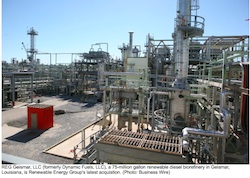The largest U.S. biodiesel company Renewable Energy Group (REG) has announced that its wholly-owned subsidiary REG Synthetic Fuels, LLC has completed its acquisition of the remaining 50 percent ownership interest in Dynamic Fuels, LLC. Dynamic Fuels was previously owned by Tyson Foods.
The new biodiesel facility will be known as REG Geismar, LLC and is a 75-million gallon renewable diesel biorefinery located in Geismar, Louisiana. The plant was formerly jointly owned by Tyson and Syntroleum and completed in 2010 as the first U.S-based large-scale renewable diesel biorefinery. The majority of the employees will stay on with REG Geismar.
 As a result of last Tuesday’s closing of its purchase of substantially all of the assets of Syntroleum Corporation and the closing of this transaction with Tyson, REG now takes full ownership of Dynamic Fuels’ 75-million gallon nameplate capacity renewable diesel biorefinery.
As a result of last Tuesday’s closing of its purchase of substantially all of the assets of Syntroleum Corporation and the closing of this transaction with Tyson, REG now takes full ownership of Dynamic Fuels’ 75-million gallon nameplate capacity renewable diesel biorefinery.
“Closing these transactions enables our entry into the renewable diesel market in a significant way,” said Daniel J. Oh, Renewable Energy Group, Inc. president and chief executive officer. “We are excited about the opportunity to offer new products to our customers, while building on our core competencies in research, engineering, production, and distribution of advanced biofuels. We look forward to bringing the Geismar biorefinery online and work to do so has begun.”
REG paid Tyson approximately $16.5 million in cash at closing and retired approximately $13.5 million of Dynamic Fuels’ indebtedness to Tyson. REG has also agreed to make up to $35 million in future payments to Tyson tied to product volumes at the Geismar biorefinery over a period of up to eleven and a half years. REG intends to use proceeds from its recent $143,750,000 convertible senior notes offering to either replace the letter of credit that Tyson Foods obtained to support the biorefinery’s $100 million in Gulf Opportunity Zone Bonds, issued through the Louisiana Public Facilities Authority, or to redeem these bonds.











